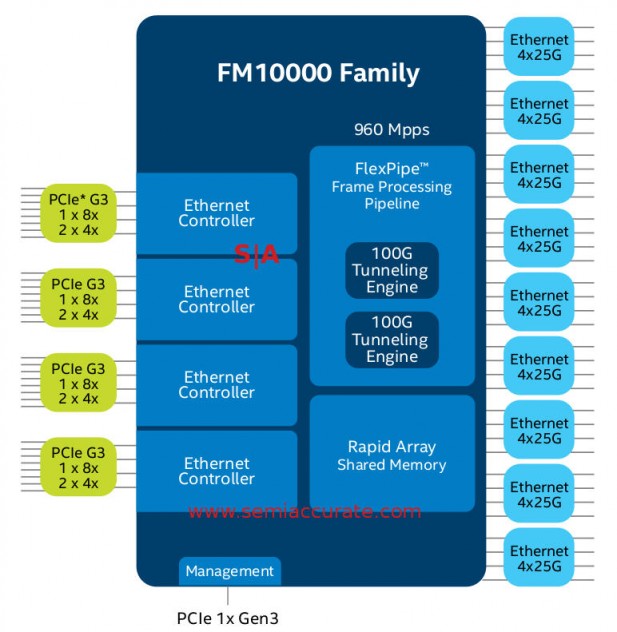 Intel is launching two new Ethernet products today, the dual 10GbE X550 and the massive FM10000 family. SemiAccurate thinks one of these is conventional, the other is a potential game changer, any guesses which is which?
Intel is launching two new Ethernet products today, the dual 10GbE X550 and the massive FM10000 family. SemiAccurate thinks one of these is conventional, the other is a potential game changer, any guesses which is which?
The conventional part is of course the X550 dual 10GbE controller, their second generation product. If you need to add a couple of 10GbE ports to your new Xeon-D box, the X550 is a good bet. It supports all of the virtualization, packet passing, QoS, VXLAN, FCoE, and iSCSI standards like you would expect. Since it is from Intel compatibility should not be a major issue, plus it should work with all the Intel networking SDKs like the DPDK and SPDK out of the box. That said it is hardly the stuff of enthusiast dreams.
FM10000 on the other hand is the stuff of enthusiast dreams, as long as you are a datacenter enthusiast, gamers won’t think too much of this one. If you take 32 lanes of PCIe3 in and 9x 100GbE out, you have quite the little networking setup in one chip. Raw speed on this level is becoming more commonplace but what makes the FM10000 interesting is its flexibility.

FM10000 is a big box of I/O with a few smarts
Those 32 PCIe3 lanes have four root controllers each of which can handle two logical lanes. That means you can have 4 8x PCIe3 outs or 8 4x PCIe3 outs to connect up to 4/8 whatever you wants. On the other side of the chip you can have up to 900Gbps out or enough for most home users. These too are quite flexible and can be arranged as 36 1GbE, 2.5GbE, or 10GbE ports, basically 36 root controllers. Since 10 * 36 < 900 you can also configure it as 24 25GbE ports, 9 40GbE ports, or 6 100GbE ports.
We know the numbers don’t add up cleanly, some configurations are controller limited, some are bandwidth limited so buy two if you need more. There are three members of the FM10000 family, starting with the Ethernet only FM10064. This has no PCIe3 data ports but has a total of 9 100GbE ports, the count for the lesser speed ports oddly remains the same. The mid-range FM10840 is the beast described above while the FM10420 is about half of that. It has two PCIe3 root ports supporting 2 8x lanes or 4 4x lanes and up to two 40GbE or 100Gbe ports. It is the home user version of the FM10840.
There are some more interesting bits with the FM10000 starting with a claimed 1000ns PCIe host-network latency and 300ns Ethernet latency at 100Gbps speeds, both pretty solid. This is all the more impressive because there is a packet tweaking engine on the device with 4MB of shared memory, QoS, NAT, and many tunneling features. There are of course full TCP/IP offload engines and all sorts of segmentation related features built-in too. In short it isn’t a dumb pipe, it does a lot of work on top of being a very fast pipe.
Note: The following is for professional and student level subscribers.
Disclosures: Charlie Demerjian and Stone Arch Networking Services, Inc. have no consulting relationships, investment relationships, or hold any investment positions with any of the companies mentioned in this report.
Charlie Demerjian
Latest posts by Charlie Demerjian (see all)
- Qualcomm Is Cheating On Their Snapdragon X Elite/Pro Benchmarks - Apr 24, 2024
- What is Qualcomm’s Purwa/X Pro SoC? - Apr 19, 2024
- Intel Announces their NXE: 5000 High NA EUV Tool - Apr 18, 2024
- AMD outs MI300 plans… sort of - Apr 11, 2024
- Qualcomm is planning a lot of Nuvia/X-Elite announcements - Mar 25, 2024